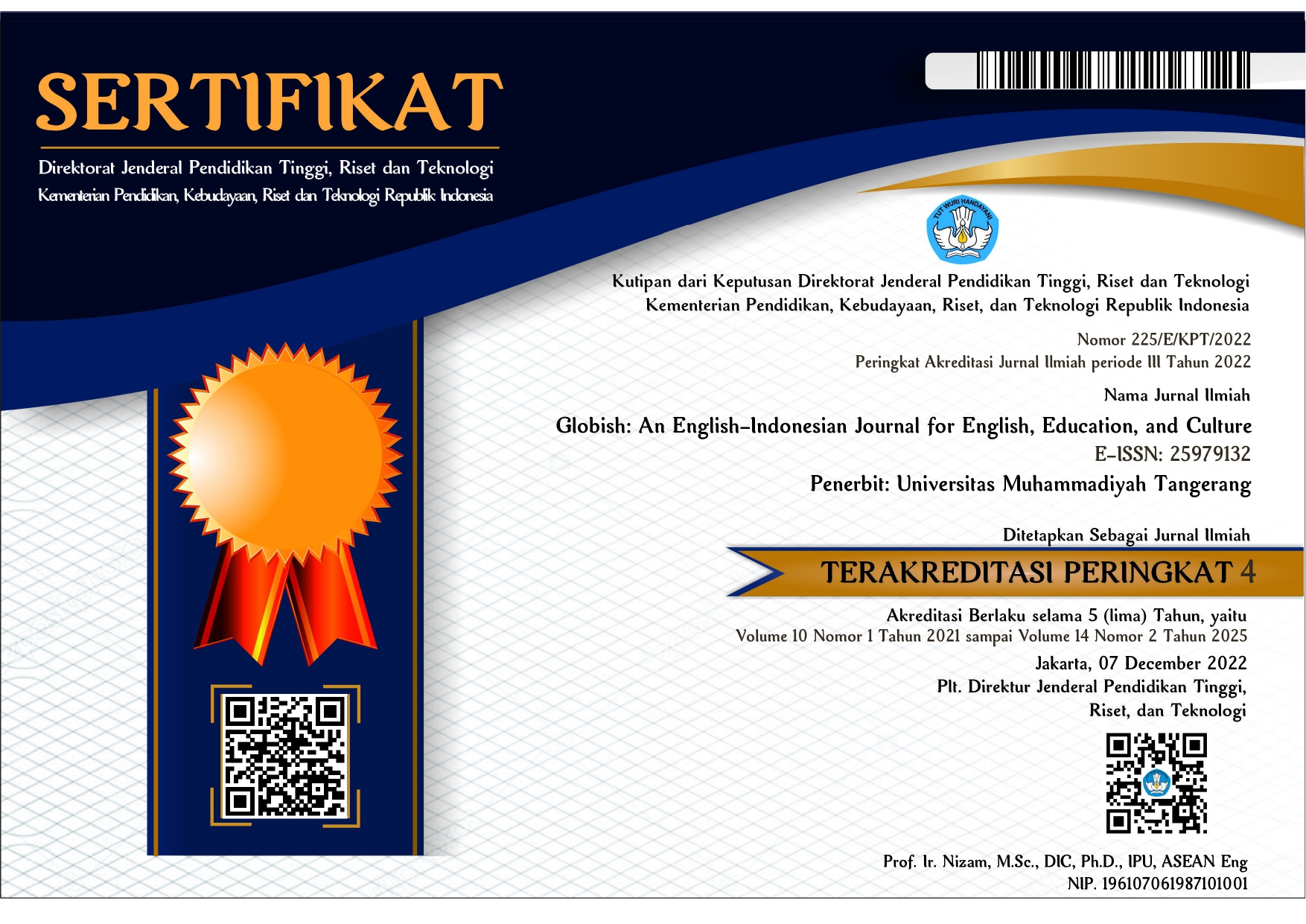Rural EFL Learners’ Insights Towards Technology Use Tendency in Language Learning
Abstract
Technology has empowered rural school learners to learn English actively without any hesitation. This study aimed to describe how rural EFL learners state their emotional and behavioral approaches to learning English using technology. A total of 119 learners who were registered in rural schools voluntarily participated in a survey study. Quantitative data were collected as an online survey by administering a scale on technology use tendency. Percentages were focused on determining learners’ tendency levels. The results reveal that rural EFL learners tended to be involved in technology integration classes. Such technology increased enthusiasm, participation, creativity, and task completion. However, some learners did not align with the integration, as technology was believed to support learning but not replace a teacher. Discussion and implied recommendations are provided to emphasize the results.
Keywords
Full Text:
PDFReferences
Alonto, A. (2024). Prospects of the Use of Mobile-Assisted Language Learning (MALL) Applications in Public Speaking Courses. Journal of English Education Program; Vol 5, No 1 (2024). https://doi.org/10.26418/jeep.v5i1.72334
Annamalai, N., Rashid, R. A., Munir Hashmi, U., Mohamed, M., Harb Alqaryouti, M., & Eddin Sadeq, A. (2023). Using chatbots for English language learning in higher education. Computers and Education: Artificial Intelligence, 5, 100153. https://doi.org/https://doi.org/10.1016/j.caeai.2023.100153
Aurora, M., Whitehead, H., Mostafa, L., Wolf, S., Kembou, S., Ogan, A., & Jasińska, K. (2024). Parental factors, learning-related skills and academic skills in rural Côte d’Ivoire. Journal of Applied Developmental Psychology, 92, 101652. https://doi.org/https://doi.org/10.1016/j.appdev.2024.101652
Bailwal, N., & Paul, S. B. (2024). Village dominance and learning gaps in rural India. Journal of Economic Behavior & Organization, 219, 52–73. https://doi.org/https://doi.org/10.1016/j.jebo.2023.12.027
Bonilla-Mejía, L., Londoño-Ortega, E., & Henao, M. F. (2024). Geographic isolation and learning: Evidence from rural schools in Colombia. Economics of Education Review, 99, 102522. https://doi.org/https://doi.org/10.1016/j.econedurev.2024.102522
Çamlıbel-Acar, Z., & Eveyik-Aydın, E. (2022). Perspectives of EFL teacher trainers and pre-service teachers on continued mandatory distance education during the pandemic. Teaching and Teacher Education, 112, 103635. https://doi.org/https://doi.org/10.1016/j.tate.2022.103635
Chen, M., Mohammadi, M., & Izadpanah, S. (2024). Language learning through music on the academic achievement, creative thinking, and self-esteem of the English as a foreign language (EFL) learners. Acta Psychologica, 247, 104318. https://doi.org/https://doi.org/10.1016/j.actpsy.2024.104318
Chimbutane, F., Herrera-Almanza, C., Karachiwalla, N., Lauchande, C., & Leight, J. (2023). COVID-19 school closures and mental health of adolescent students: Evidence from rural Mozambique. SSM - Mental Health, 3, 100203. https://doi.org/https://doi.org/10.1016/j.ssmmh.2023.100203
Dai, Y., & Wu, Z. (2022). Mobile-assisted peer feedback on EFL pronunciation: Outcome effects, interactional processes, and shaping factors. System, 111, 102953. https://doi.org/https://doi.org/10.1016/j.system.2022.102953
Dong, H., Qu, H., Liu, P., & Apuke, O. D. (2024). The effectiveness of using interactive visual multimedia technology intervention in improving the literacy skills of children in rural China. Learning and Motivation, 86, 101964. https://doi.org/https://doi.org/10.1016/j.lmot.2024.101964
Fakhri Alamdari, E., & Bozorgian, H. (2022). Gender, metacognitive intervention, and dialogic interaction: EFL multimedia listening. System, 104, 102709. https://doi.org/https://doi.org/10.1016/j.system.2021.102709
González-Lloret, M. (2023). The road System travelled: Five decades of technology in language education. System, 118, 103124. https://doi.org/https://doi.org/10.1016/j.system.2023.103124
Gonzalez-Vidal, T., & Moore, P. (2024). Technology-enhanced language and culture teaching in Chile: the perceptions and practices of in-service EFL teachers. Journal for Multicultural Education, 18(12), 25–37. https://doi.org/https://doi.org/10.1108/JME-08-2023-0073
Günüç, S., & Kuzu, A. (2014). Tendency Scale For Technology Use In Class: Development, Reliability And Validity Tt - Derste Teknoloji Kullanimina Yönelik Eğilim Ölçeği: Geliştirme, Güvenirlik Ve Geçerlik. Eğitimde Kuram ve Uygulama, 10(4), 863–884. https://dergipark.org.tr/en/pub/eku/issue/5462/74146
Hamlin, D., Adigun, O., & Adams, C. (2023). Do virtual schools deliver in rural areas? A longitudinal analysis of academic outcomes. Computers & Education, 199, 104789. https://doi.org/https://doi.org/10.1016/j.compedu.2023.104789
Han, J., & Geng, X. (2023). University students’ approaches to online learning technologies: The roles of perceived support, affect/emotion and self-efficacy in technology-enhanced learning. Computers & Education, 194, 104695. https://doi.org/https://doi.org/10.1016/j.compedu.2022.104695
Hasanah, A. S., Alfisuma, M. Z., & Pujiati, T. (2025). Student’s Perception Towards the Use of ICT in Improving English Speaking Skill in Boarding School. Globish Journal, 14(1), 45–59. http://dx.doi.org/10.31000/globish.v14i1.12750
Huertas-Abril, C. A., & Palacios-Hidalgo, F. J. (2024). Collaborative international online learning for the development of intercultural awareness: an experience with pre-service language teachers. Journal for Multicultural Education, 18(12), 67–80. https://doi.org/https://doi.org/10.1108/JME-09-2023-0093
Jeon, J., Lee, S., & Choe, H. (2022). Enhancing EFL pre-service teachers’ affordance noticing and utilizing with the Synthesis of Qualitative Evidence strategies: An exploratory study of a customizable virtual environment platform. Computers & Education, 190, 104620. https://doi.org/https://doi.org/10.1016/j.compedu.2022.104620
Karakaya, K., & Bozkurt, A. (2022). Mobile-assisted language learning (MALL) research trends and patterns through bibliometric analysis: Empowering language learners through ubiquitous educational technologies. System, 110, 102925. https://doi.org/https://doi.org/10.1016/j.system.2022.102925
Kingsford-Smith, A. A., Alonzo, D., Beswick, K., Loughland, T., & Roberts, P. (2024). Perceived autonomy support as a predictor of rural students’ academic buoyancy and academic self-efficacy. Teaching and Teacher Education, 142, 104516. https://doi.org/https://doi.org/10.1016/j.tate.2024.104516
Kingsford-Smith, A. A., Collie, R. J., Loughland, T., & Nguyen, H. T. M. (2023). Teacher wellbeing in rural, regional, and metropolitan schools: Examining resources and demands across locations. Teaching and Teacher Education, 132, 104229. https://doi.org/https://doi.org/10.1016/j.tate.2023.104229
Lai, Y., Saab, N., & Admiraal, W. (2022). University students’ use of mobile technology in self-directed language learning: Using the integrative model of behavior prediction. Computers & Education, 179, 104413. https://doi.org/https://doi.org/10.1016/j.compedu.2021.104413
Lee, H. (2022). What drives the performance of Chinese urban and rural secondary schools: A machine learning approach using PISA 2018. Cities, 123, 103609. https://doi.org/https://doi.org/10.1016/j.cities.2022.103609
Lee, Y.-J., & Roger, P. (2023). Cross-platform language learning: A spatial perspective on narratives of language learning across digital platforms. System, 118, 103145. https://doi.org/https://doi.org/10.1016/j.system.2023.103145
Li, Z., Guan, P., Li, J., & Wang, J. (2024). Comparing online and offline Chinese EFL learners’ anxiety and emotional engagement. Acta Psychologica, 242, 104114. https://doi.org/https://doi.org/10.1016/j.actpsy.2023.104114
Mutambara, D., & Bayaga, A. (2021). Determinants of mobile learning acceptance for STEM education in rural areas. Computers & Education, 160, 104010. https://doi.org/https://doi.org/10.1016/j.compedu.2020.104010
Nami, F., & Asadnia, F. (2024). Exploring the effect of EFL students’ self-made digital stories on their vocabulary learning. System, 120, 103205. https://doi.org/https://doi.org/10.1016/j.system.2023.103205
Pabayo, F. S., Rosnija, E., & Wajdi, M. (2022). Teaching Simple Past Tense in Narrative Text Using Animation Movie Through Online Learning. Journal of English Education Program; Vol 3, No 2 (2022). https://doi.org/10.26418/jeep.v3i2.52141
Palacios Mena, N., & Jiménez, J. (2024). Doing research in the rural school: Colombian schoolteachers’ experiences as researchers and their expectancies toward a research-based formation. Teaching and Teacher Education, 141, 104496. https://doi.org/https://doi.org/10.1016/j.tate.2024.104496
Pennington, V., Howell, E., Kaminski, R., Ferguson-Sams, N., Gazioglu, M., Mittapalli, K., Banerjee, A., & Cole, M. (2024). Multilingual teaching and digital tools: the intersections of new media literacies and language learning. Journal for Multicultural Education, 18(12), 126–138. https://doi.org/https://doi.org/10.1108/JME-09-2023-0092
Persulessy, S. I., Nikijuluw, R. P. J. V., & Jakob, J. C. (2024). Utilizing Artificial Intelligence in Language Learning: What About Engineering Students’ Perception? Journal of English Education Program; Vol 5, No 1 (2024)DO - 10.26418/Jeep.V5i1.71159 . https://jurnal.untan.ac.id/index.php/JEEP/article/view/48-58
Prayudha, J. (2023). Students’ Problems in Implementing Technology Integrated in ELT Classroom. Journal of English Education Program; Vol 4, No 2 (2023). https://doi.org/10.26418/jeep.v4i2.64583
Rezai, A., Namaziandost, E., & Teo, T. (2024). EFL teachers’ perceptions of emotional literacy: A phenomenological investigation in Iran. Teaching and Teacher Education, 140, 104486. https://doi.org/https://doi.org/10.1016/j.tate.2024.104486
Safdar, S., Ren, M., Chudhery, M. A. Z., Huo, J., Rehman, H.-U., & Rafique, R. (2022). Using cloud-based virtual learning environments to mitigate increasing disparity in urban-rural academic competence. Technological Forecasting and Social Change, 176, 121468. https://doi.org/https://doi.org/10.1016/j.techfore.2021.121468
Sak, M. (2022). Dynamicity of language teacher motivation in online EFL classes. System, 111, 102948. https://doi.org/https://doi.org/10.1016/j.system.2022.102948
Shi, H., & Cheung, L. M. E. (2024). Storytelling for understanding: a case study of an English-language digital storytelling service-learning subject for refugee children in Hong Kong. Journal for Multicultural Education, 18(12), 81–97. https://doi.org/https://doi.org/10.1108/JME-10-2023-0116
Suhartina, S., Rezeki, Y. S., & Suhartono, L. (2022). STUDENTS’ MOTIVATION IN LEARNING ENGLISH DURING THE ONLINE CLASS. Journal of English Education Program; Vol 3, No 2 (2022). https://doi.org/10.26418/jeep.v3i2.50580
Sunway, A. W., Arapah, E., & Muth'im, A. (2024). Students’ Engagement in the Implementation of Flipped Classroom for English Lessons. Journal of English Education Program; Vol 5, No 1 (2024). https://doi.org/10.26418/jeep.v5i1.69756
Taghizadeh, M., & Amirkhani, S. (2022). Pre-service EFL teachers’ conceptions and strategy use in managing online classes. System, 104, 102671. https://doi.org/https://doi.org/10.1016/j.system.2021.102671
Trinh, A.-H., & Dinh, H. (2024). Language and home-culture integrated online learning curriculum for developing intercultural communicative competence. Journal for Multicultural Education, 18(12), 38–52. https://doi.org/https://doi.org/10.1108/JME-09-2023-0097
Wachira, N., & Klinger, D. A. (2023). Building teachers’ capacity in assessment for learning in rural East Africa (R. J. Tierney, F. Rizvi, & K. B. T.-I. E. of E. (Fourth E. Ercikan, Eds.; pp. 202–211). Elsevier. https://doi.org/https://doi.org/10.1016/B978-0-12-818630-5.09009-6
Wang, S., Liu, T., & Lee, C. I. (2023). The efficacy of CALL glossing on EFL learners’ idiom learning. Acta Psychologica, 241, 104060. https://doi.org/https://doi.org/10.1016/j.actpsy.2023.104060
Xu, B., Ma, Q., & Yu, Q. (2024). Does the proportion of rural students affect the performance of urban students? ––Evidence from urban schools in China. International Journal of Educational Development, 105, 102971. https://doi.org/https://doi.org/10.1016/j.ijedudev.2023.102971
DOI: http://dx.doi.org/10.31000/globish.v14i2.13430
Article Metrics
Abstract - 396 PDF - 119Refbacks
- There are currently no refbacks.
Globish
Program Studi Pendidikan Bahasa Inggris
Fakultas Keguruan dan Ilmu Pendidikan
Universitas Muhammadiyah Tangerang
Jl. Perintis Kemerdekaan I/33, Cikokol
Kota Tangerang, Indonesia
e-mail: globish_journal@umt.ac.id
Globish (p-ISSN: 2301-9913 | e-ISSN: 2301-9913) is licensed under a Creative Commons Attribution-ShareAlike 4.0 International License.









